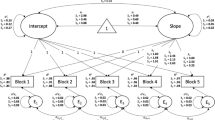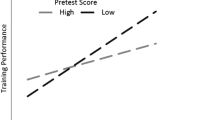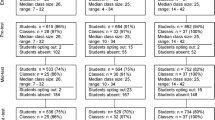Abstract
In working memory training studies, individual trajectories are known to vary considerably between participants. A better understanding of how individual differences affect training outcomes is important because it might inform the development of more effective training interventions. This study explored how measures of working memory, intelligence, sustained attention, training motivation, mindset, psychological well-being, perceived stress, and sleep quality affect initial training performance and rate of change. A total of 217 upper secondary students completed 12 weeks of adaptive dual-n-back in a classroom setting. We analyzed their self-reported training data using latent growth curve modeling. We found that working memory and intelligence predicted both, initial training performance and rate of performance change. Sustained attention and sleep quality predicted initial performance, but not the rate of change. Furthermore, we observed that participants who completed the intervention scored significantly higher on measures of working memory and intelligence and reported lower levels of perceived stress and higher levels of sleep quality at baseline compared to dropouts. In general, our study supports the magnification account with higher ability individuals starting out at a higher performance level and showing a higher rate of performance change, and moreover, being more likely to adhere to the training protocol.





Similar content being viewed by others
Data Availability
Data sharing is restricted according to the General Data Protection Regulation (GDPR) in European Union (EU). Data cannot be shared, because it contains potentially identifying and sensitive personal information.
Change history
21 August 2021
A Correction to this paper has been published: https://doi.org/10.1007/s41465-021-00221-8
References
Alloway, T. P., & Alloway, R. G. (2010). Investigating the predictive roles of working memory and IQ in academic attainment. Journal of experimental child psychology, 106(1), 20–29.
Au, J., Sheehan, E., Tsai, N., Duncan, G. J., Buschkuehl, M., & Jaeggi, S. M. (2015). Improving fluid intelligence with training on working memory: A meta-analysis. Psychonomic bulletin & review, 22(2), 366–377.
Baddeley, A. (1992). Working memory. Science, 255(5044), 556–559.
Bahník, Š., & Vranka, M. A. (2017). Growth mindset is not associated with scholastic aptitude in a large sample of university applicants. Personality and Individual Differences, 117, 139–143.
Bender, R., & Lange, S. (2001). Adjusting for multiple testing—when and how? Journal of clinical epidemiology, 54(4), 343–349.
Borella, E., Carretti, B., Cantarella, A., Riboldi, F., Zavagnin, M., & De Beni, R. (2014). Benefits of training visuospatial working memory in young–old and old–old. Developmental psychology, 50(3), 714.
Borella, E., Carbone, E., Pastore, M., De Beni, R., & Carretti, B. (2017). Working memory training for healthy older adults: the role of individual characteristics in explaining short-and long-term gains. Frontiers in Human Neuroscience, 11, 99.
Brose, A., Schmiedek, F., Lövdén, M., & Lindenberger, U. (2012). Daily variability in working memory is coupled with negative affect: the role of attention and motivation. Emotion, 12(3), 605.
Bücker, S., Nuraydin, S., Simonsmeier, B. A., Schneider, M., & Luhmann, M. (2018). Subjective well-being and academic achievement: A meta-analysis. Journal of Research in Personality, 74, 83–94. https://doi.org/10.1016/j.jrp.2018.02.007.
Bühner, M., König, C. J., Pick, M., & Krumm, S. (2006). Working memory dimensions as differential predictors of the speed and error aspect of multitasking performance. Human Performance, 19(3), 253–275.
Bürki, C. N., Ludwig, C., Chicherio, C., & de Ribaupierre, A. (2014). Individual differences in cognitive plasticity: an investigation of training curves in younger and older adults. Psychological Research, 78(6), 821–835.
Buysse, D. J., Reynolds III, C. F., Monk, T. H., Berman, S. R., & Kupfer, D. J. (1989). The Pittsburgh Sleep Quality Index: a new instrument for psychiatric practice and research. Psychiatry research, 28(2), 193–213.
Cameron, J., & Pierce, W. D. (1994). Reinforcement, reward, and intrinsic motivation: A meta-analysis. Review of Educational research, 64(3), 363–423.
Cerasoli, C. P., Nicklin, J. M., & Ford, M. T. (2014). Intrinsic motivation and extrinsic incentives jointly predict performance: A 40-year meta-analysis. Psychological bulletin, 140(4), 980.
Cohen, S., Kamarck, T., & Mermelstein, R. (1983). A global measure of perceived stress. Journal of health and social behavior, 385–396.
Colom, R., Román, F. J., Abad, F. J., Shih, P. C., Privado, J., Froufe, M., Escorial, S., Martinez, K., Burgaleta, M., Quiroga, M. A., Karama, S., Haier, R. J., Thompson, P. M., & Jaeggi, S. M. (2013). Adaptive n-back training does not improve fluid intelligence at the construct level: Gains on individual tests suggest training may enhance visuospatial processing. Intelligence, 41(5), 712–727.
Dahlin, E., Nyberg, L., Bäckman, L., & Neely, A. S. (2008). Plasticity of executive functioning in young and older adults: immediate training gains, transfer, and long-term maintenance. Psychology and aging, 23(4), 720.
Deci, E. L., Koestner, R., & Ryan, R. M. (1999). A meta-analytic review of experiments examining the effects of extrinsic rewards on intrinsic motivation. Psychological bulletin, 125(6), 627.
Deveau, J., Jaeggi, S. M., Zordan, V., Phung, C., & Seitz, A. R. (2015). How to build better memory training games. Frontiers in Systems Neuroscience, 8, 243–243. https://doi.org/10.3389/fnsys.2014.00243.
Dweck, C. S. (1986). Motivational processes affecting learning. American psychologist, 41(10), 1040.
Dweck, C. S. (2013). Self-theories: Their role in motivation, personality, and development: Psychology press.
Dweck, C. S., & Chiu, C.-y., & Hong, Y.-y. (1995). Implicit theories and their role in judgments and reactions: A word from two perspectives. Psychological inquiry, 6(4), 267–285.
Engle, R. W. (2002). Working memory capacity as executive attention. Current directions in psychological science, 11(1), 19–23.
Eskildsen, A., Dalgaard, V. L., Nielsen, K. J., Andersen, J. H., Zachariae, R., Olsen, L. R., et al. (2015). Cross-cultural adaptation and validation of the Danish consensus version of the 10-item Perceived Stress Scale. Scandinavian journal of work, environment & health, 486–490.
Fellman, D., Jylkkä, J., Waris, O., Soveri, A., Ritakallio, L., Haga, S., et al. (2020). The role of strategy use in working memory training outcomes. Journal of Memory and Language, 110, 104064.
Fenn, K. M., & Hambrick, D. Z. (2012). Individual differences in working memory capacity predict sleep-dependent memory consolidation. Journal of experimental psychology: General, 141(3), 404–410. https://doi.org/10.1037/a0025268.
Flora, D. B. (2008). Specifying piecewise latent trajectory models for longitudinal data. Structural Equation Modeling: A Multidisciplinary Journal, 15(3), 513–533.
Ford, M. T., Cerasoli, C. P., Higgins, J. A., & Decesare, A. L. (2011). Relationships between psychological, physical, and behavioural health and work performance: A review and meta-analysis. Work & Stress, 25(3), 185–204.
Foster, J. L., Harrison, T. L., Hicks, K. L., Draheim, C., Redick, T. S., & Engle, R. W. (2017). Do the effects of working memory training depend on baseline ability level? Journal of Experimental Psychology: Learning, Memory, and Cognition, 43(11), 1677.
Gathercole, S. E., Dunning, D. L., Holmes, J., & Norris, D. (2019). Working memory training involves learning new skills. Journal of Memory and Language, 105, 19–42.
Guðmundsdóttir, H. B., Olason, D. P., Guðmundsdóttir, D. G., & Sigurðsson, J. F. (2014). A psychometric evaluation of the Icelandic version of the WHO-5. Scand J Psychol, 55(6), 567–572. https://doi.org/10.1111/sjop.12156.
Guye, S., & Von Bastian, C. C. (2017). Working memory training in older adults: Bayesian evidence supporting the absence of transfer. Psychology and aging, 32(8), 732.
Guye, S., De Simoni, C., & von Bastian, C. C. (2017). Do individual differences predict change in cognitive training performance? A latent growth curve modeling approach. Journal of Cognitive Enhancement, 1(4), 374–393.
Heun, R., Burkart, M., Maier, W., & Bech, P. (1999). Internal and external validity of the WHO Well-Being Scale in the elderly general population. Acta Psychiatr Scand, 99(3), 171–178. https://doi.org/10.1111/j.1600-0447.1999.tb00973.x.
Hu, L. t., & Bentler, P. M. (1999). Cutoff criteria for fit indexes in covariance structure analysis: Conventional criteria versus new alternatives. Structural Equation Modeling: A Multidisciplinary Journal, 6(1), 1–55.
Jaeggi, S. M., Buschkuehl, M., Jonides, J., & Perrig, W. J. (2008). Improving fluid intelligence with training on working memory. Proceedings of the National Academy of Sciences, 105(19), 6829–6833.
Jaeggi, S. M., Buschkuehl, M., Perrig, W. J., & Meier, B. (2010). The concurrent validity of the N-back task as a working memory measure. Memory, 18(4), 394–412.
Jaeggi, S. M., Buschkuehl, M., Shah, P., & Jonides, J. (2014). The role of individual differences in cognitive training and transfer. Memory & cognition, 42(3), 464–480.
Jaeggi, S. M., Buschkuehl, M., Parlett-Pelleriti, C. M., Moon, S. M., Evans, M., Kritzmacher, A., et al. (2019). Investigating the Effects of Spacing on Working Memory Training Outcome: A Randomized, Controlled, Multisite Trial in Older Adults. The Journals of Gerontology: Series B, 75(6), 1181–1192. https://doi.org/10.1093/geronb/gbz090.
Karbach, J., & Verhaeghen, P. (2014). Making working memory work: a meta-analysis of executive-control and working memory training in older adults. Psychological science, 25(11), 2027–2037.
Jenkins Jr., G. D., Mitra, A., Gupta, N., & Shaw, J. D. (1998). Are financial incentives related to performance? A meta-analytic review of empirical research. Journal of applied psychology, 83(5), 777.
Karbach, J., Könen, T., & Spengler, M. (2017). Who benefits the most? Individual differences in the transfer of executive control training across the lifespan. Journal of Cognitive Enhancement, 1(4), 394–405.
Katz, B., Jones, M. R., Shah, P., Buschkuehl, M., & Jaeggi, S. M. (2016). Individual differences and motivational effects. In Cognitive training 157-166 Springer.
Katz, B., Jaeggi, S. M., Buschkuehl, M., Shah, P., & Jonides, J. (2018). The effect of monetary compensation on cognitive training outcomes. Learning and Motivation, 63, 77–90.
Kliegl, R., & Lindenberger, U. (1993). Modeling Intrusions and Correct Recall in Episodic Memory: Adult Age Differences in Encoding of List Context. Journal of experimental psychology. Learning, memory, and cognition, 19, 617–637. https://doi.org/10.1037/0278-7393.19.3.617.
Könen, T., & Karbach, J. (2015). The benefits of looking at intraindividual dynamics in cognitive training data. Frontiers in psychology, 6, 615.
Kuriyama, K., Mishima, K., Suzuki, H., Aritake, S., & Uchiyama, M. (2008). Sleep accelerates the improvement in working memory performance. Journal of Neuroscience, 28(40), 10145–10150.
Laine, M., Fellman, D., Waris, O., & Nyman, T. J. (2018). The early effects of external and internal strategies on working memory updating training. Scientific Reports, 8(1), 4045. https://doi.org/10.1038/s41598-018-22396-5.
Lau, E. Y. Y., Wong, M. L., Lau, K. N. T., Hui, F. W. Y., & Tseng, C.-h. (2015). Rapid-Eye-Movement-Sleep (REM) Associated Enhancement of Working Memory Performance after a Daytime Nap. PLoS One, 10(5), e0125752. https://doi.org/10.1371/journal.pone.0125752.
Lo, J. C., Groeger, J. A., Santhi, N., Arbon, E. L., Lazar, A. S., Hasan, S., et al. (2012). Effects of partial and acute total sleep deprivation on performance across cognitive domains, individuals and circadian phase. PLoS One, 7(9), e45987.
Lo, J., Ong, J. L., Leong, R., Gooley, J., & Chee, M. (2015). Cognitive Performance, Sleepiness, and Mood in Partially Sleep Deprived Adolescents: The Need for Sleep Study. Sleep, 39. https://doi.org/10.5665/sleep.5552.
Lövdén, M., Brehmer, Y., Li, S.-C., & Lindenberger, U. (2012). Training-induced compensation versus magnification of individual differences in memory performance. [Original Research]. Frontiers in Human Neuroscience, 6, 141. https://doi.org/10.3389/fnhum.2012.00141.
Matysiak, O., Kroemeke, A., & Brzezicka, A. (2019). Working Memory Capacity as a Predictor of Cognitive Training Efficacy in the Elderly Population. [Original Research]. Frontiers in aging neuroscience, 11, 126. https://doi.org/10.3389/fnagi.2019.00126.
McDermott, L. M., & Ebmeier, K. P. (2009). A meta-analysis of depression severity and cognitive function. Journal of Affective Disorders, 119(1), 1–8. https://doi.org/10.1016/j.jad.2009.04.022.
Meiran, N., Dreisbach, G., & von Bastian, C. C. (2019). Mechanisms of working memory training: Insights from individual differences. Intelligence, 73, 78–87. https://doi.org/10.1016/j.intell.2019.01.010.
Melby-Lervåg, M., & Hulme, C. (2013). Is working memory training effective? A meta-analytic review. Developmental psychology, 49(2), 270.
Melby-Lervåg, M., Redick, T. S., & Hulme, C. (2016). Working memory training does not improve performance on measures of intelligence or other measures of “far transfer” evidence from a meta-analytic review. Perspectives on Psychological Science, 11(4), 512–534.
Metcalfe, A., MacIntosh, B., Scavone, A., Ou, X., Korczak, D., & Goldstein, B. (2016). Effects of acute aerobic exercise on neural correlates of attention and inhibition in adolescents with bipolar disorder. Translational psychiatry, 6(5), e814.
Mohammed, S., Flores, L., Deveau, J., Hoffing, R. C., Phung, C., Parlett, C. M., et al. (2017). The benefits and challenges of implementing motivational features to boost cognitive training outcome. Journal of Cognitive Enhancement, 1(4), 491–507.
Ørskov, P. T. (2020). Evaluation of the Effectiveness of a Multifacted Brain Training Intervention Applied in an Upper Secondary School Setting. (PhD thesis). University of Southern Denmark
Ørskov, P. T., & Beatty, E. L. (2018). Psychometric investigation of the subtest odd item out from reynolds intellectual screening test in a sample of Danish students. In nordic meeting in neuropsychology, Stockholm, 22–24.
Ørskov, P. T., Norup, A., Debrabant, B., & Beatty, E. L. (2020). Increasing Working Memory in Young Healthy Adults: A cluster randomized controlled trial of a multifaceted brain training intervention. Journal of Cognitive Enhancement. https://doi.org/10.1007/s41465-020-00191-3.
Park, I., & Schutz, R. W. (2005). An Introduction to latent growth model: analysis of repeated measures physical performance data. Research quarterly for exercise and sport, 76(2), 176–192.
Paulhus, D. L. (1984). Two-component models of socially desirable responding. Journal of personality and social psychology, 46(3), 598.
Pergher, V., Shalchy, M. A., Pahor, A., Van Hulle, M. M., Jaeggi, S. M., & Seitz, A. R. (2019). Divergent research methods limit understanding of working memory training. Journal of Cognitive Enhancement, 1–21.
Redick, T. S. (2019). The Hype Cycle of Working Memory Training. Current directions in psychological science, 28(5), 423–429. https://doi.org/10.1177/0963721419848668.
Reynolds, C. R., & Kamphaus, R. W. (2011). RIAS/RIST Reynolds Intellectual Assessment Scales. Reynolds Intellectual Screening Test: Vejledning. : Hogrefe Psykologisk Forlag A/S.
Rhodes, R. E., & Katz, B. (2017). Working memory plasticity and aging. Psychology and aging, 32(1), 51.
Ryan, R. M., & Deci, E. L. (2000). Self-determination theory and the facilitation of intrinsic motivation, social development, and well-being. American psychologist, 55(1), 68.
Sandström, A., Rhodin, I. N., Lundberg, M., Olsson, T., & Nyberg, L. (2005). Impaired cognitive performance in patients with chronic burnout syndrome. Biological psychology, 69(3), 271–279.
Santisteban, J. A., Brown, T. G., Ouimet, M. C., & Gruber, R. (2019). Cumulative mild partial sleep deprivation negatively impacts working memory capacity but not sustained attention, response inhibition, or decision making: a randomized controlled trial. Sleep health, 5(1), 101–108.
Schmeichel, B. J., Volokhov, R. N., & Demaree, H. A. (2008). Working memory capacity and the self-regulation of emotional expression and experience. Journal of personality and social psychology, 95(6), 1526.
Schougaard, L. M. V., de Thurah, A., Bech, P., Hjollund, N. H., & Christiansen, D. H. (2018). Test-retest reliability and measurement error of the Danish WHO-5 Well-being Index in outpatients with epilepsy. Health and quality of life outcomes, 16(1), 175.
Schwaighofer, M., Fischer, F., & Bühner, M. (2015). Does working memory training transfer? A meta-analysis including training conditions as moderators. Educational Psychologist, 50(2), 138–166.
Segretin, M. S., Lipina, S., Hermida, M. J., Sheffield, T., Nelson, J., Espy, K., et al. (2014). Predictors of cognitive enhancement after training in preschoolers from diverse socioeconomic backgrounds. [Original Research]. Frontiers in psychology, 5, 205. https://doi.org/10.3389/fpsyg.2014.00205.
Sisk, V. F., Burgoyne, A. P., Sun, J., Butler, J. L., & Macnamara, B. N. (2018). To what extent and under which circumstances are growth mind-sets important to academic achievement? Two meta-analyses. Psychological science, 29(4), 549–571.
Soveri, A., Antfolk, J., Karlsson, L., Salo, B., & Laine, M. (2017). Working memory training revisited: A multi-level meta-analysis of n-back training studies. Psychonomic bulletin & review, 24(4), 1077–1096.
Stickgold, R. (2005). Sleep-dependent memory consolidation. Nature, 437(7063), 1272.
Studer-Luethi, B., Jaeggi, S. M., Buschkuehl, M., & Perrig, W. J. (2012). Influence of neuroticism and conscientiousness on working memory training outcome. Personality and Individual Differences, 53(1), 44–49. https://doi.org/10.1016/j.paid.2012.02.012.
Studer-Luethi, B., Bauer, C., & Perrig, W. J. (2016). Working memory training in children: Effectiveness depends on temperament. Memory & cognition, 44(2), 171–186.
Thompson, T. W., Waskom, M. L., Garel, K.-L. A., Cardenas-Iniguez, C., Reynolds, G. O., Winter, R., et al. (2013). Failure of working memory training to enhance cognition or intelligence. PLoS One, 8(5), e63614.
Topp, C. W., Østergaard, S. D., Søndergaard, S., & Bech, P. (2015). The WHO-5 Well-Being Index: a systematic review of the literature. Psychotherapy and psychosomatics, 84(3), 167–176.
Tsai, N., Eccles, J. S., & Jaeggi, S. M. (2019). Stress and executive control: mechanisms, moderators, and malleability. Brain and Cognition, 133, 54–59.
Tsai, N., Jaeggi, S. M., Eccles, J. S., Atherton, O. E., & Robins, R. W. (2020). Predicting Late Adolescent Anxiety From Early Adolescent Environmental Stress Exposure: Cognitive Control as Mediator. [Original Research]. Frontiers in psychology, 11, 1838. https://doi.org/10.3389/fpsyg.2020.01838.
Unsworth, N., & Engle, R. W. (2007). On the division of short-term and working memory: an examination of simple and complex span and their relation to higher order abilities. Psychological bulletin, 133(6), 1038.
Vartanian, O., Coady, L., & Blackler, K. (2016). 3d multiple object tracking boosts working memory span: Implications for cognitive training in military populations. Military Psychology, 28(5), 353–360.
Weicker, J., Villringer, A., & Thöne-Otto, A. (2016). Can impaired working memory functioning be improved by training? A meta-analysis with a special focus on brain injured patients. Neuropsychology, 30(2), 190.
Wiemers, E. A., Redick, T. S., & Morrison, A. B. (2019). The Influence of Individual Differences in Cognitive Ability on Working Memory Training Gains. Journal of Cognitive Enhancement, 3(2), 174–185. https://doi.org/10.1007/s41465-018-0111-2.
Xie, W., Berry, A., Lustig, C., Deldin, P., & Zhang, W. (2019). Poor Sleep Quality and Compromised Visual Working Memory Capacity. Journal of the International Neuropsychological Society, 1–12.
Zinke, K., Noack, H., & Born, J. (2018). Sleep augments training-induced improvement in working memory in children and adults. Neurobiology of learning and memory, 147, 46–53.
Acknowledgements
The authors want to thank the students, teachers, and schools participating in the Young Brain Project.
Funding
This study was funded by Nordea-fonden, www.nordeafonden.dk, grant number 02-2015-1925. SMJ is supported by the National Institute of Aging (grant number 1K02AG054665).
Author information
Authors and Affiliations
Corresponding author
Ethics declarations
Consent to Participate
Written consent to participate was obtained.
Consent for Publication
Not applicable.
Conflict of Interest
The authors declare no competing interests.
Additional information
Publisher’s Note
Springer Nature remains neutral with regard to jurisdictional claims in published maps and institutional affiliations.
Rights and permissions
About this article
Cite this article
Ørskov, P.T., Norup, A., Beatty, E.L. et al. Exploring Individual Differences as Predictors of Performance Change During Dual-N-Back Training. J Cogn Enhanc 5, 480–498 (2021). https://doi.org/10.1007/s41465-021-00216-5
Received:
Accepted:
Published:
Issue Date:
DOI: https://doi.org/10.1007/s41465-021-00216-5




